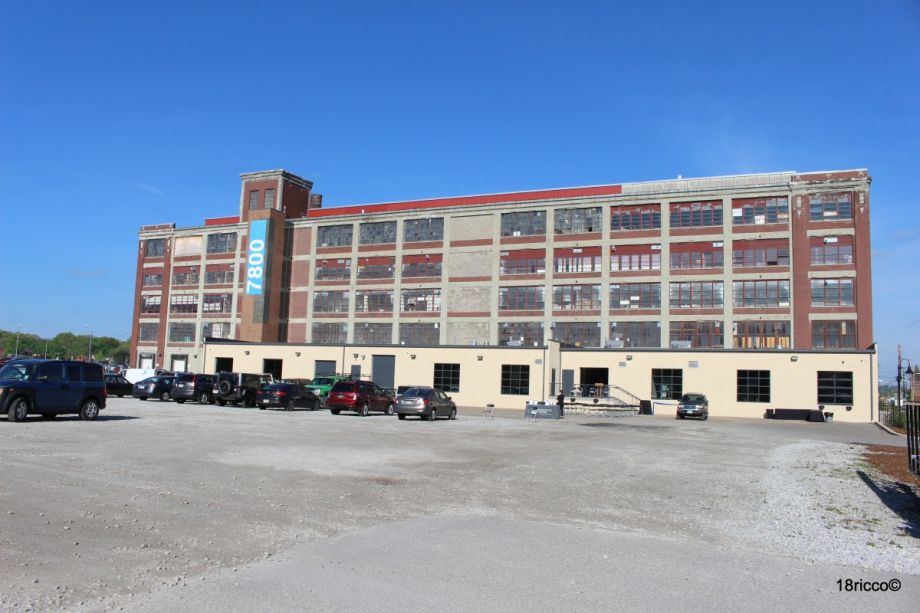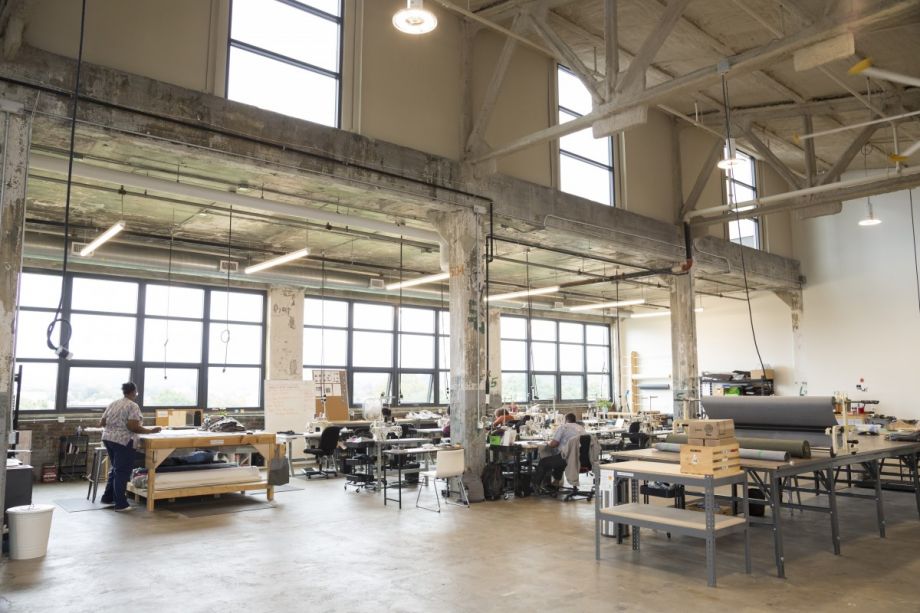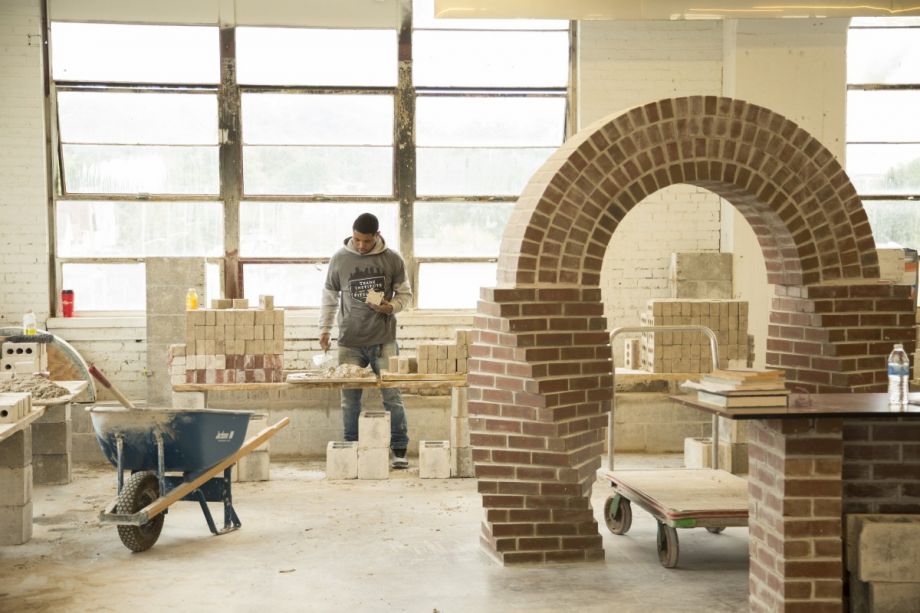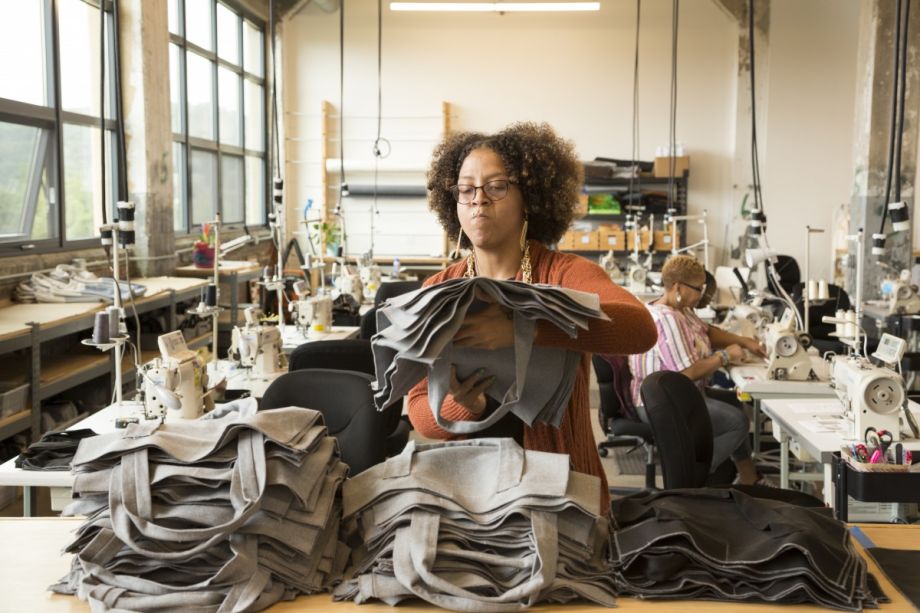At Knotzland Bowtie Company, founder Nisha Blackwell and the team recently reached a new milestone. A member of the seamstress team surpassed Blackwell’s own record for the number of handcrafted bowties completed per hour. The seamstresses get paid per piece.
“We celebrate it,” Blackwell says. “People ask how are you going to grow, and part of it is I believe in this. Part of it is I’m in a great location.”
“If I ever were to say, get a storefront, I’d want it to be as accessible to the bus line as this place, because we have a seamstress community who depend on these buses,” Blackwell says. “To be so close to the busway to help them earn income, that’s nothing to sneeze at because a lot of opportunities to earn income you have to have a car … It really knocks down some of the barriers people face.”
Located adjacent to a stop on a major bus thruway, the building housing Knotzland’s headquarters is right in the predominantly black Homewood neighborhood Blackwell has called home all her life. “I never thought that I’d be able to make a living making things and manufacturing things of my own that I designed and doing it right smack dab in the community where I grew up,” she says. “In a million years I would have never been able to see that happening.”
Seeing the inside of the building for the first time helped inspire Blackwell’s vision. The Westinghouse Electric Company built 7800 Susquehanna Street in 1925 to house a foundry, warehouse and offices. It’s five floors of solid concrete and brick masonry construction, 32,000 square feet on the first floor and 24,000 square feet on each of the upper floors. It’s the tallest building in the surrounding neighborhood by far.
It’s the kind of building that one could easily see converted into industrial loft apartments, or office space for Duolingo, Uber or some other tech firm that has moved into town over the past few years. Google moved into a former Nabisco factory just two miles west of here in 2010.

There are now 23 tenants occupying the five-story building at 7800 Susquehanna. (Photo courtesy CDFI Fund)
But instead, stories like Blackwell’s have become the rule rather than the exception for 7800 Susquehanna. The tenants in this building are curated carefully to reflect the building’s original function as a place for manufacturing and blue-collar work — good paying jobs that don’t necessarily require four or more years of college debt. As much as possible, the tenants also promise some kind of connection to the neighborhood.
“When my family members come and visit the studio, they remember when it was the Westinghouse, then it was a school, and then it was the welfare office,” Blackwell says. “I’m able to bring other people into this building and incorporate them into this larger community and show the kids at the high school around the corner examples of a creative entrepreneur being able to work in this space.”
As has been the case in places like Brooklyn, the Far South Side of Chicago, or San Francisco, nonprofit stewardship of industrial property is helping preserve and expand these spaces, providing stability in competitive real estate markets for manufacturing businesses and workforce development programs serving marginalized and vulnerable populations.
“The building found us,” says Matthew Madia, who spearheads real estate development work as chief strategy and development officer for Bridgeway Capital, the nonprofit loan fund that acquired 7800 Susquehanna in 2013.
The Richard King Mellon Foundation and the Heinz Endowments, two well-known foundations with local roots, first approached Bridgeway about acquiring the building when it came on the market in 2012. The former provided the funding for Bridgeway to acquire the building.
“They brought us in because we had familiarity with the type of project and we had the size and the balance sheet big enough to take on something that we all knew was ultimately going to be an eight-figure project,” Madia says.
While Bridgeway had almost two decades of experience providing loans and steering federal tax credits for other manufacturers and businesses around the Pittsburgh region to build or revitalize buildings in low- and moderate-income neighborhoods like Homewood, 7800 Susquehanna was the first property the loan fund would acquire, renovate, and lease up as developer.
“We knew how much the building was going to cost, but we only had back of envelope calculations on the renovations,” Madia says. “We weren’t sure how quickly we could get it leased up.”
So far, using a combination of foundation grants, a federal grant, state dollars, some local dollars and federal New Markets Tax Credits, Bridgeway Capital has put around $10 million into renovating and modernizing the building. There are now 23 tenants occupying all but 4,500 remaining square feet on the fifth floor — the priciest floor due to it having completely new windows and being the only floor with air conditioning.
“The first four floors leased up entirely by word of mouth,” Madia says.

(Photo courtesy CDFI Fund)
Tenants include the Radiant Hall Arts Collective (of which Knotzland is a member), sustainable backpack producer Thread International, BoXZY, and also workforce development nonprofits like the Trade Institute of Pittsburgh and the Manufacturing Assistance Center (an initiative of the University of Pittsburgh’s Swanson School of Engineering). The standard lease offered to tenants has been for five years, with two five-year renewal options — stability and predictability that such tenants would be hard-pressed to find elsewhere, even in a city with as proud and rich a manufacturing history as Pittsburgh.
Bridgeway has been approached by other nonprofits as well as tech firms looking for such long-term, affordable space, but has turned some of them away because they don’t fit the building’s mission to provide job opportunities that are accessible to residents of the surrounding neighborhood or other systematically disinvested neighborhoods in the Pittsburgh region.
“We have some job creation metrics especially with state and federal funding, and that’s ultimately what it comes down to for us — are you creating jobs that could reasonably be offered to folks in the community,” Madia says. “If the answer to that is no, then we typically can’t offer those groups any significant amounts of space.”
The location was request-for-proposal perfect in 2016 when the University of Pittsburgh and its Swanson School of Engineering were looking to move its Manufacturing Assistance Center into the core city after two decades in a suburban industrial park.
“Since moving to Homewood late in 2017, we’ve had about 70 people a year going through our program and graduating,” says Claire Guth, director of outreach for the Manufacturing Assistance Center. “We have a ninety five percent job placement rate, and about 40 percent [of students] are coming from an underserved neighborhood in the city of Pittsburgh. About 35 percent of them are coming straight from jail.”
Guth says they have also been ramping up youth programs at the center, since 7800 Susquehanna is around the corner from a high school. “It’s a really important building for youth especially to see because a lot of kids have no idea what manufacturing is, and they don’t know what manufacturing looks like,” she says.
The Trade Institute of Pittsburgh teaches masonry and carpentry construction trades mostly to formerly incarcerated individuals from the Pittsburgh area. In 2018, the institute placed 71 students in jobs paying $15/hour or better, with 85 percent of students coming out of incarceration. Steve Shelton founded the organization out of the back of his truck in 2009 before moving into the boiler room in the basement of a halfway house in Homewood.
“Being in a one thousand square foot boiler room with eight students and an instructor, we were doing good, but there’s such a demand for quality talent in the construction industry right now,” Shelton says.
The Trade Institute of Pittsburgh now leases 10,500 square feet of space at 7800 Susquehanna. “It was wide open space with concrete columns and windows, and now today I’m sitting in a beautiful office that graduates of the Trade Institute of Pittsburgh actually built,” Shelton says.

Students at The Trade Institute of Pittsburgh, many of whom were formerly incarcerated, learn masonry and carpentry at 7800 Susquehanna. (Photo courtesy CDFI Fund)
Now he’s looking forward to rehabbing an old duplex the Trade Institute of Pittsburgh acquired to serve as transitional housing for up to eight students at the institute. It’s all so poetic, because, Shelton says, it was a Homewood resident who lived a block from 7800 Susquehanna who first taught him how to mix mortar and lay brick when he was just 12 years old.
There may soon be more work in the neighborhood for Shelton’s students. Homewood has more than 2,000 vacant lots, 600 vacant buildings, and a plan to do something about them. As part of its ownership of 7800 Susquehanna, Bridgeway Capital also plans to set aside surplus funds from the building’s net income to reimburse homeowners in the surrounding blocks for home improvements like new roofs or new windows. (“We wanted to pursue a community ownership model, and foundations were really excited about it, but it just didn’t work out in the tax credit paperwork, so this is a compromise,” Shelton says.)
Bridgeway Capital is also working on a community vision for phase two of 7800 Susquehanna, taking over some additional vacant land and properties just to the west of the current building, with some frontage Braddock Avenue, a key road running through the area. Shelton is looking forward to alumni working on that as well.
“It’s a long term vision, and it happens organically,” Shelton says. “It’s not like you’re going to bring a couple hundred million dollars into a community and just drop it down and kick everybody out.”
This article is part of The Bottom Line, a series exploring scalable solutions for problems related to affordability, inclusive economic growth and access to capital. Click here to subscribe to our Bottom Line newsletter.

Oscar is Next City's senior economic justice correspondent. He previously served as Next City’s editor from 2018-2019, and was a Next City Equitable Cities Fellow from 2015-2016. Since 2011, Oscar has covered community development finance, community banking, impact investing, economic development, housing and more for media outlets such as Shelterforce, B Magazine, Impact Alpha and Fast Company.
Follow Oscar .(JavaScript must be enabled to view this email address)










